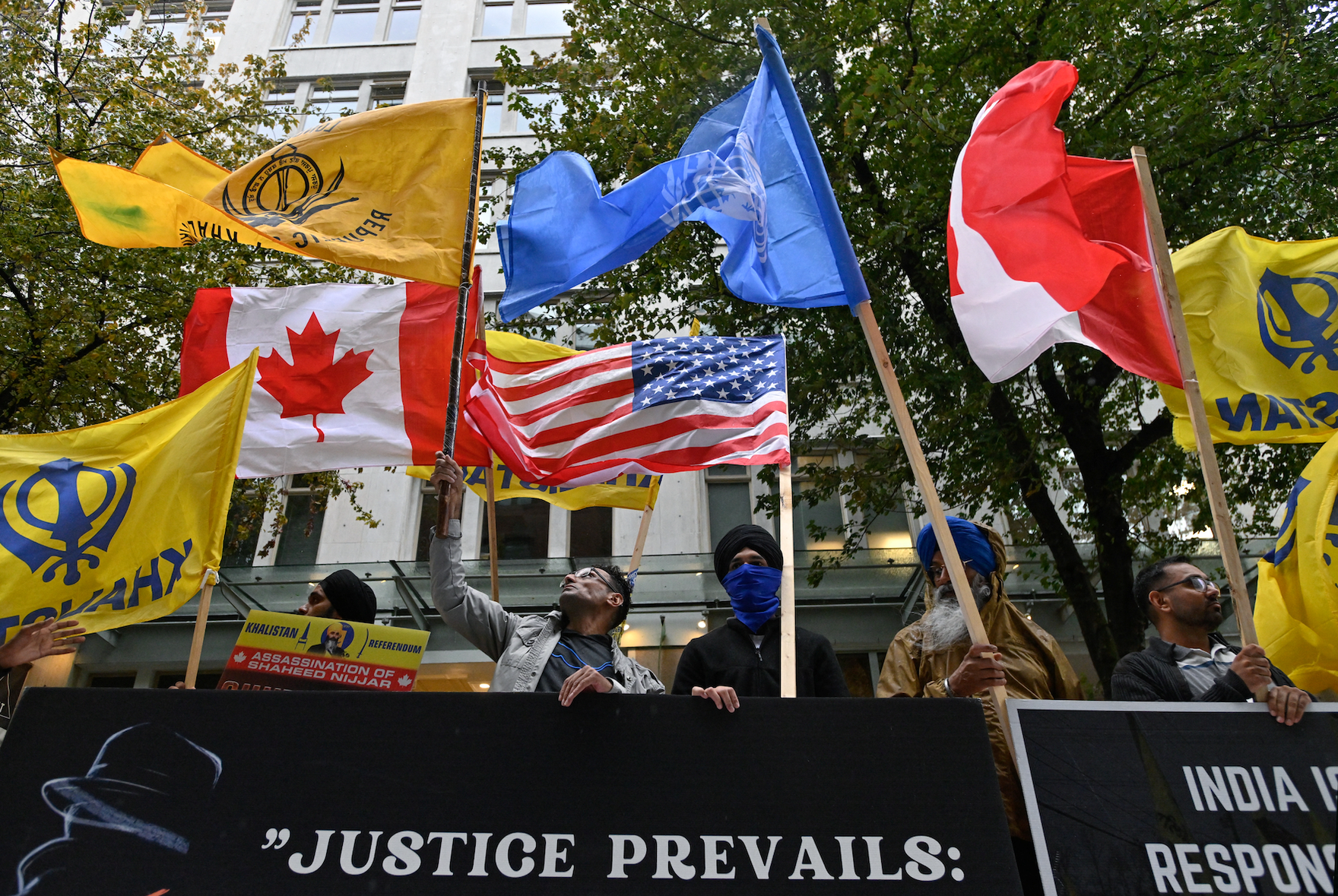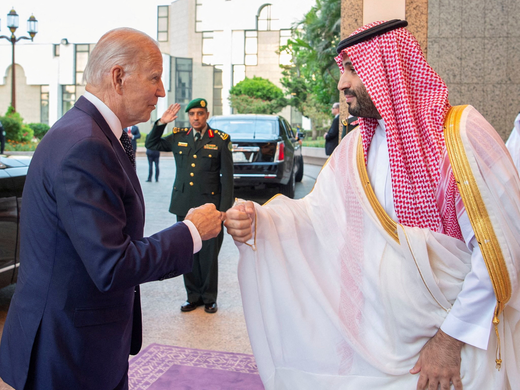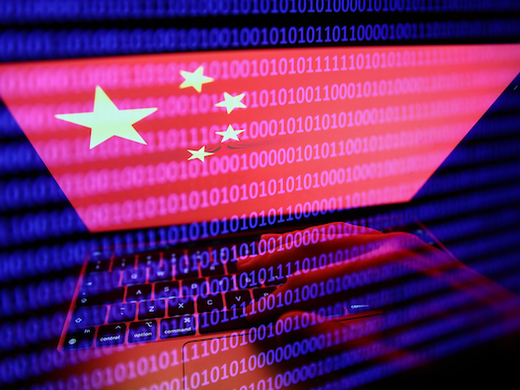Over the past months, events have forced Canadians to face a sobering fact: Canada is a frequent target of foreign interference and transnational repression (TNR). The first wake-up call came on June 18, 2023, when Hardeep Singh Nijjar, a vocal advocate for the creation of Khalistan, a separate homeland for Sikhs, was murdered in his home province of British Columbia, where he had settled in 1997. Nijjar was wanted under India’s terrorist act. Canada has accused India of being involved in the murder of the Sikh leader — a claim backed up by intelligence sources.
Then there’s the case of Canadian member of Parliament (MP) Michael Chong, a vocal critic of China’s treatment of its minority Uighur community, who learned in August 2022 that a Chinese diplomat had been collecting information about him and his family. Chong was also the target of a coordinated disinformation campaign on WeChat in May 2023. According to Global Affairs Canada, the campaign bore manipulation and interference.” The MP was invited to speak about his experience to the US Congressional-Executive Commission on China in Washington, DC, on September 12.
These are only two recent prominent examples. TNR is an “everyday problem for many Canadians,” according to activists such as Dan Hao, leader of the Vancouver branch of the Democratic Party of China. Political foreign interference is “happening at all levels of government,” according to Cherie Wong, executive director of Alliance Canada Hong Kong.
These serious incidents have contributed to several important developments in Canada, including the current public inquiry into allegations of attempted foreign interference in Canadian affairs, the potential reform of the law on foreign interference, consultations on the influence and criminal law to respond to foreign interference. In December 2023, a decision by a federal court judge Chinese resident, on grounds the engineering student could be pressured by Beijing into spying. Yuekang Li, who was accepted to the University of Waterloo’s mechanical and mechatronics engineering Ph.D. program in April 2022, was denied a study permit based on the potential risk that he might be “‘coerced into providing information’ to Chinese authorities ‘that would be detrimental to Canada or contrary to Canada’s interests.’” The judge, who sided with the immigration officer, argued that Li’s Beijing-based university has ties to China’s defence industry.
What Is Digital TNR?
While there is no internationally agreed-upon definition of TNR, Washington, DC-based Freedom House defines TNR as a tactic used by countries to “silence their exiles and diaspora abroad,” which encompasses “a spectrum of tactics, from assassinations, to renditions, to spyware, to intimidation of exiles’ family members who have stayed behind.”
Globalization and communication technologies are inseparable from TNR. With the ubiquity of smartphones, and the more recent emergence of spyware and artificial intelligence (AI), TNR has become increasingly digital. Its forms range from low-cost harassment and disinformation campaigns on social media and threatening phone calls on Skype or Zoom, to hard-to-detect spyware, malware and digital surveillance. New cyber capabilities have enabled states to engage in the remote collection of private information in insidious ways, to the detriment of privacy and freedom of expression.
Diaspora communities are particularly at risk, because they rely on technology to stay in touch with family and friends in their country of origin. Political activists who have gone abroad are a target since many tend to use social media to continue their fight for democracy and human rights in their host country. The technological revolution and globalization have thus normalized digital TNR. As digital technologies advance, malevolent actors are likely to adapt their tactics, leaving their targets little place to hide. As digital security researcher John Scott-Railton states, “The capacity to connect has vastly outpaced the ability to secure.”
Remote-access cyber espionage against rights activists is increasingly sophisticated and intrusive.
Canada Is Far from Immune
With its large diaspora communities, Canada is particularly at risk of foreign interference and TNR. Indeed, according to special report, the main state perpetrators of TNR in Canada are countries such as China, Iran, Russia and Rwanda.
Remote-access cyber espionage against rights activists is increasingly sophisticated and intrusive. One prominent recent Canadian case is that of Omar Abdulaziz, a Saudi Arabian dissident who sought asylum in Canada in 2014 after his criticism of the Saudi government drew the regime’s ire. Once in Canada, he built on his activism and became friends with Jamal Khashoggi, the Saudi dissident journalist assassinated by agents of the Saudi government in October 2018. Shortly before Khashoggi’s murder, Abdulaziz discovered that his phone had been compromised with the now notorious Pegasus Spyware, a surveillance tool developed by NSO Group, an Israeli cyber-intelligence company. In a 2021 interview with the CBC, Abdulaziz said he is convinced his conversations with Khashoggi were intercepted and contributed to the latter’s murder.
According to a 2020 report by Amnesty International Canada and the Canadian Coalition on Human Rights in China, members of China’s persecuted Muslim minority Uighur community have been the target of the regime’s TNR as the Communist Party of China (CCP) attempts to prevent members of the Uighur diaspora from speaking out. In Canada, Uighur activists such as Mehmet Tohti and Kayum Masimov have spoken to media outlets such as Maclean’s, Global News, Reuters and La Presse, as well as Amnesty International Canada, about the tactics used by the Chinese government and its proxies. These have included threatening phone calls, smear campaigns, physical and digital surveillance, and taking families in China hostage in an attempt to silence dissent.
Bakhtiar Semseddin, a Montreal-based Uighur activist, told me in December 2023 via email that threats against him and his community have significantly increased in recent months, especially in the digital realm. He said he has received numerous suspicious phone calls and text messages with questionable links. The social media pages of the Montreal-based organization of which he is a member, International Support for Uyghurs, and the World Uyghur Congress, have been the target of various scam messages.
Semseddin added that the group’s Facebook page was temporarily suspended in October 2023, after what he says were malicious and false complaints of violations of the platform’s community standards. In our conversation, he reported that members of Montreal’s Uighur community had received phone calls threatening consequences for their families in China, should they participate in actions against the CCP. Semseddin said he refuses to self-censor, but added that many members of the community have distanced themselves from him in order to avoid threats from Beijing and its proxies. This is one of the aims of TNR, according to Toronto-based Citizen Lab: instill a climate of fear in order to force people to cut ties with each other, thereby breaking up groups and communities that threaten the authoritarian state’s power.
Semseddin’s experience is similar to that of many dissidents who dare criticize the Chinese state, including Chemi Lhamo, a Canadian citizen of Tibetan origin who had been involved with groups such as Students for a Free Tibet and the Tibetan Youth Alliance Committee. In 2019, after becoming the student president of the University of Toronto Scarborough campus, Lhamo became the target of hateful online campaigns, death threats and accusations of anti-Chinese prejudice. Before her election, messages on the Chinese social media app WeChat urged Chinese international students to prevent her from becoming president. According to a 2020 report by the Canadian Coalition on Human Rights in China and Amnesty International Canada, the tone of the messages “echoed familiar language used by Chinese state authorities,” and she received phone calls playing pro-CCP propaganda songs.
The impact of such campaigns on the personal lives and mental health of victims is serious. In an interview, Wong said she has completely cut ties with her family in China in order to protect herself and her loved ones. Similarly, relentless coordinated online attacks against Sheng Xue, former president of the Federation for a Democratic China, took a toll on the organization, leading it to split in two in 2017.
Indeed, the Chinese state is adept at using its high-level technological capabilities as part of its transnational operations. Benjamin Fung, a Hong Kong-born Canadian computer scientist based in Montreal, told me that the CCP and its proxies in Canada use both low-tech and sophisticated methods to silence critics. Low-cost techniques include disinformation in traditional media and on social media.
Authoritarian regimes that engage in TNR also target people who are not immigrants from that country.
Often, coordinated campaigns will start with an article in a traditional Chinese media outlet that will then be shared in WeChat groups in Canada and amplified, thanks to bots and trolls, Fung explained. Such campaigns can also find their way onto large public platforms such as YouTube via Chinese-speaking social media influencers in Canada.
This disinformation/propaganda feedback loop between traditional and mainstream social media platforms has been observed on the far right as well. WeChat allows Chinese Canadians to stay in touch and create social groups. But the app can easily be abused to spread state-orchestrated disinformation and TNR campaigns.
Other techniques of digital TNR include basic email spear phishing. Fung said he has more than once received blank emails containing malware meant to infect his phone. As a cyber expert, he said, he knows how malware can be used to hack into a phone. And these spear-phishing emails are also a form of threat. Fung says the emails are always sent 48 hours after he has taken part in public pro-democracy demonstrations, thereby sending a message: “We are watching you.”
It’s important to add that authoritarian regimes that engage in TNR also target people who are not immigrants from that country. Marcus Kolga, a Canadian global human rights and cybersecurity expert based at the Macdonald-Laurier Institute in Ottawa, told me in an email exchange that he has been the target of Chinese and Russian digital TNR. Kolga said he was personally targeted by state proxies and trolls in late 2023 for his criticism of the Kremlin’s illegal invasion of Ukraine. He told me via email that some of the campaigns have been overt, such as publishing articles in state media, and governments targeting him and others with disparaging or defamatory claims.
Kolga said that even if researchers and critics develop mechanisms with which to defend themselves against smear campaigns, the effects can be traumatic. Although Kolga has a team of colleagues and friends to defend him, each time an article appears in Russian state media, or a far-left or far-right platform attacks him on social media, “they build on the traumas caused by previous attacks,” he explained. “The indented chilling effect of this is real, and I now self-censor myself to avoid being retraumatized.”
New technologies such as AI will likely make digital TNR worse. Kolga says foreign authoritarian actors have long been airbrushing photos and distorting events to advance their own interests. AI gives them even greater ability to create credible fake images, audio and video to misrepresent their intended target.
A Long-Awaited Response
While recent revelations about foreign influence campaigns and TNR in Canada have made Canadians more aware of these tactics, the federal government and Canadian authorities appear to have long been aware of the threat. In 2020, Public Safety and Emergency Preparedness Minister Bill Blair warned against intimidate or threaten That same year, the Commons Subcommittee on International Human Rights and the Commons Special Committee on Canada-China Relations heard testimonies from Uighur victims of TNR who warned that Chinese government agents were threatening them in Canada.
In 2021, David Vigneault, then-director of the Canadian Security Intelligence Service (CSIS), gave a speech to the Centre for International Governance Innovation in which he acknowledged that “a number of foreign states engage in hostile actions that routinely threaten and intimidate individuals in Canada to instill fear, silence dissent, and pressure political opponents.”
Nonetheless, some victims of TNR have complained about the lack of an adequate response from Canadian law enforcement agencies and CSIS. A 2022 study by Citizen Lab, titled Psychological and Emotional War, asserted that the Canadian government as well as law enforcement and intelligence services had failed to provide victims with emotional, personal or legal support. Consequently, “participants [in the study] simply avoided dealing with the police, fearing that it might make the situation worse or that they could not be of assistance.” This finding resonates with comments made by Semseddin and Fung during our conversations. Both told me that the Canadian government needs to do much more to help diaspora communities, particularly individuals who are the targets of TNR.
One problem seems to be that this form of interference currently falls outside the scope of criminal law in Canada, and thus does not constitute a legal offence. Similarly, under international law, there is no agreed-upon definition of TNR. This means little is done internationally to restrain it.
As Canada’s former minister of justice, human rights activist Irwin Cotler, rightly argued in a article, the Canadian government should “embrace a stand-alone definition of transnational repression,” since it is not defined in federal legislation. A common definition and understanding of the threat would give Canada more power to hold perpetrators accountable. And it would allow victims to seek redress.
Canada should also impose costs on regimes and their proxies, including Canadians who collaborate with them, who try to intimidate and silence people in Canada. Current public consultations on the CSIS Act could be a step in the right direction, as the agency aims to find solutions to counter foreign influence campaigns. Proposed amendments to the CSIS Act would increase the capacity of the agency to collect, share information about and respond to foreign influence in a coordinated way.
In the meantime, more can be done to help victims and their families. This could include providing continuous digital training for democracy activists who wish to continue their work in Canada but lack the digital knowledge and resources to protect themselves. Further, law enforcement agencies and CSIS could set up helplines for targets of TNR who wish to report repression. Kolga also believes that CSIS should be given the authority to engage in two-way conversations with vulnerable communities and individuals, to warn them of threats and to advise on how they can defend themselves.
The Canadian government and authorities have a duty to protect people who live in this country. Under international human rights law, a host state must protect the rights of individuals within its territory and must “take action in relation to third parties that is necessary and reasonable in the circumstances to ensure that individuals are able to enjoy their rights online.” Currently, that is not happening to a sufficient degree. In an era of growing geopolitical ferment, this must change.



